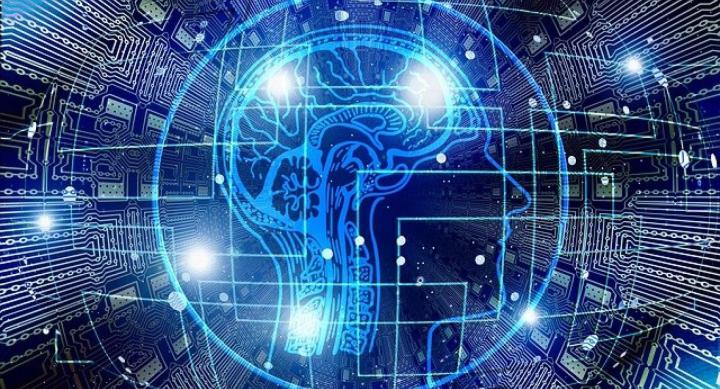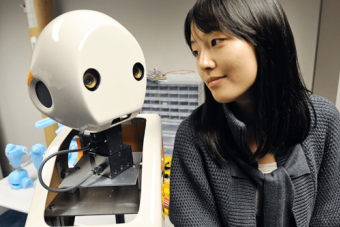Data is one of the most valuable commodities in the information society. Workers with the skills to collect, manage, and analyze data to gain new insights are in great demand.
This Informatics major concentration will train students to think critically and use data in an ethically responsible manner in artificial intelligence, machine learning, information retrieval, data curation, and data analysis.

Human-centered data science focuses on principles and techniques to extract useful meaning from data in order to solve real-world problems.

Core Competencies
Students in the Human-Centered Data Science Informatics major concentration will learn to:
Collect, structure, and analyze data and leverage it for organisational and societal benefit.
Build workflows for managing and sharing data and code for reproducible analysis.
Identify biases as well as societal and ethical challenges and concerns for effectively harnessing data.
Human-Centered Data Science - Informatics Major Concentration
Informatics majors learn the skills and knowledge required to collect, manage, and analyze data and information, and prepare for the great ethical responsibility that comes with these societally transformative roles.
Students develop an understanding of the complex social, cultural, and ethical context related to communicating with digital and social media tools, and to apply this understanding to creating digital solutions and technologies that are effective, inclusive, and responsive to the needs, values, and perspectives of people with many different lived experiences.
Human-Centered Data Science Informatics major concentration requirements include:
I 301 : Introduction to Informatics - 3 HRS
In this introductory course, students will explore the foundational theories, concepts, and challenges in Cultural Heritage Informatics, Health Informatics, Human-Centered Data Science, Social Informatics, Social Justice Informatics, and User Experience Design.
I 310D: Introduction to Human-Centered Data Science - 3 HRS
Introduction to Human-Centered Data Science provides students with the skills and knowledge needed to explore and analyze 'big data' with an understanding of technical, social, and ethical considerations. It also provides students with an opportunity to better appreciate how data and analytics can be used to develop strategies, plans, and policies to improve both business and community operations.
I 310X: Additional Introductory Concentration Course - 3 HRS
In addition to taking the introductory course for their selected Informatics major concentration, students must also complete an introductory course in another Informatics major concentration:
- I 310C - Cultural Heritage Informatics
- I 310M - Health Informatics
- I 310S - Social Informatics
- I 310J - Social Justice Informatics
- I 310U - User Experience Design
I 320D: Advanced Topics in Human-Centered Data Science - 9 HRS
Students must complete nine credit hours in Advanced Topics in Human-Centered Data Science.
I 379C: Capstone - 3 HRS
Students pursuing the School of Information Honors distinction may substitute I 679H: Honors Thesis (6 HRS).
I Elective - 3 HRS
Students must complete three credit hours of Informatics elective coursework at the School of Information.
iSchool General Education Requirements - 27 HRS
- Informatics 302 - Academic Success in the Digital University (3 hours)
- Informatics 372 - Career Success in the Digital Organization (3 hours)
- Informatics 303 - Ethical Foundations for Informatics or equivalent (3 hours)
- Informatics 304 - Programming for Informatics or equivalent (3 hours)
- Informatics 305 - Research Methods for Informatics or equivalent (3 hours)
- Informatics 306 - Statistics for Informatics or equivalent (3 hours)
- Foreign Language: Beginning-level proficiency coursework, or the equivalent, in a foreign language (3 hours)
- Additional liberal arts OR science, technology, engineering, and math coursework (6 hours)

Undergraduate Informatics Program
Leverage insights from data and information technology to solve problems.

Academic Advising
Get advice and information to enhance your academic experience.
Schedule an Appointment
Labs and Research

Human-AI Interaction Lab
The Human-AI Interaction lab aims to create technology that supports individual and collective human decision-making. We explore psychological understandings of AI and develop human-centered methods and systems for better AI-integrated workplaces, smart communities and cities, and online information.

Information Retrieval Lab
The Information Retrieval and Crowdsourcing Lab was established to advance the state-of-the-art methodologies for search and human computation/crowdsourcing. The aim is to integrate crowdsourcing with automatic algorithms to improve search engine experiences, capabilities, and evaluation.